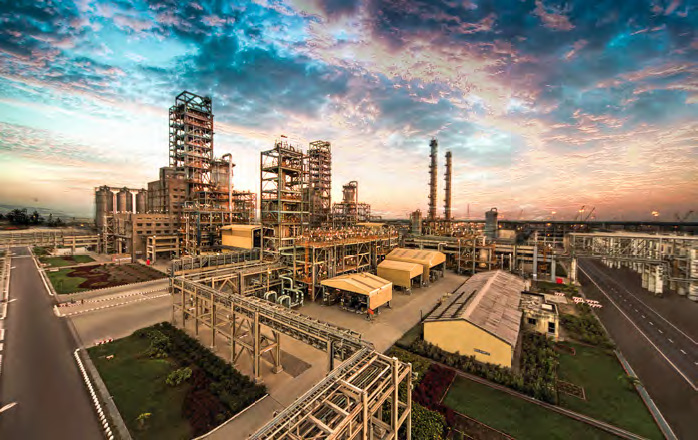Financial Capital 
Maximising Stakeholders Value

Highlights FY 2020-21
`79,667 crore
Capital expenditure
`53,739 crore
Net profit
`97,580 crore
EBITDA
`14,817 crore
Total spend on employee benefits
`5,39,238 crore
Revenue
Maximising stakeholder value is the core philosophy at Reliance. Be it shareholders, customers, suppliers, employees, communities, providers of capital like bondholders and banks – Reliance considers all of them in its value creation process.
The Company’s investments are focused on R&D, inclusive growth and promotion of new businesses while addressing national and global priorities, including meeting environmental goals, and providing optimal returns for all stakeholders.
The Company’s robust financial and operating performance despite COVID-19 induced restrictions and economic challenges is reflective of its inherent strengths and sound strategy. It has always aligned its businesses with its goal of building an inclusive, strong, prosperous and self-reliant India.
Reliance has always maintained a conservative financial profile with an optimum capital structure and investment-grade credit ratings. The Company has been recognised as the biggest wealth creator among Indialisted entities for the period 1995-2020.
To ensure that it follows the highest standards of governance and compliance while growing, the Company has set up various committees to monitor and review performance regularly. The committees comprise functional leaders, experts and management representatives to identify and mitigate potential risks and take timely measures. Reliance’s track record of building world-class businesses is testimony to its approach for sustainable value creation. This involves establishing leadership position in chosen areas of businesses, investing in state-of-the-art technologies and creating strong consumer value proposition.

Economic Performance
The pandemic has altered the way we live and work. Reliance has been able to successfully navigate through turbulent times and displayed the resilience of its business model by generating strong financial numbers. During the reporting period, Reliance generated revenue of `5,39,238 crore lower by 18.3%; EBITDA of `97,580 crore, lower by 4.6%; and net profit of `53,739 crore, higher by 34.8% compared to FY 2019-20. The decrease in revenue was primarily due to lower volume and realisation across key O2C products and marginally lower revenues on account of store closures and operational disruptions in the Retail segement. This was partially offset by higher revenue from the Digital Services segment.
Largest ever capital raise in India
During FY 2020-21, Reliance forged defining strategic partnerships with leading technology firms and marquee investors across businesses. Through the rights issue and asset monetisation, Reliance executed the largest ever capital raised in India.
`2,60,074 crore
Largest ever capital raised in India
The fund raised along with capital commitments exceeded net debt levels, helping Reliance achieve a net debt free balance sheet ahead of the stated timeline of March 2021. Last year it successfully raised `53,124 crore through a rights issue, which was oversubscribed 1.59 times. The successful completion of capital infusion is a reflection of the shareholder’s trust in it.
Business Performance
Reliance’s businesses performed well across the board and generated strong cash inflows notwithstanding the challenging macro environment.
Reliance Retail delivered a resilient performance despite the unprecedented and challenging operating environment arising from the COVID-19 situation. During the reporting period, Reliance Retail generated a gross revenue of `1,53,818 crore. The revenues were impacted on account of store closures (80% stores operational), lower footfalls (65% of last year) and operational challenges. Through gradual rebound of revenue streams, judicious cost management initiatives and higher investment income, the business posted its all-time high profit (EBITDA) of `9,842 crore. During the year, Reliance Retail continued its focus on expansion, strengthening omni-channel presence and digital platforms and building capacities for home delivery. The business expanded its partnership with merchants across the country under its inclusive New Commerce model. By the end of the year, the digital commerce and merchant partnerships business contributed nearly 10% of revenues, significantly stepped up from near zero in the preceding year. Reliance Retail made strategic investment throughout the year to strengthen its capabilities in supply chain, technology and product portfolio. These include the acquisition of a leading marketplace, Netmeds, furniture and home décor retailer, Urban Ladder, and the lingerie and intimate wear brand, Zivame.

In Digital Services, Reliance Jio became the first operator outside China to onboard 400 million subscribers in a single country market. The business segment delivered revenues of `90,287 crore, as against `69,605 crore in previous year. The segment EBITDA was at `34,035 crore for the year, as against `23,348 crore in previous year. The pandemic-induced lockdown and work-from-home (WFH) adoption resulted in increased usage of digital data and related services. Jio had a total customer base of 426.2 million as on March 31, 2021 and is ranked #1 mobile operator in terms of both Adjusted Gross Revenue (AGR) and subscribers. To ensure people remain connected during the pandemic, Jio is leaving no stone unturned to enable all Indians to work from home, learn from home and access healthcare at home through its world-class broadband solutions. Strategic initiatives to be rolled out by Jio in partnership with Facebook and Google will further improve its consumer service offerings. In the next leg of its growth story, Jio is committed to democratising digital services and enhancing customer experience through innovative platforms and services.
Reliance is committed to invest and grow in the media industry amidst a dynamic business environment. Network18 Media & Investments aims to be a channel-agnostic provider of top-draw content across genres, languages and geographies. During the reporting period, consolidated EBITDA rose by 29% y-o-y to `796 crore despite the impact of the pandemic dragging revenues by 12% y-o-y. The media industry, which is heavily dependent on advertising revenue, faced many challenges due to COVID-19, but the advertising revenue has largely recovered and subscription share in the revenue is on the rise. Network18 has used this opportunity to rethink its business model and is growing stronger.
Reliance has initiated the process of carving out the O2C business, which is expected to complete in 2021. O2C a key engine of growth for Reliance. It offers the right opportunity to accelerate into new energy and new material businesses buoyed by growing presence in the clean energy space. Reliance operated its O2C facilities at near 100% even during the COVID-19 crisis by shifting products to foreign markets. Its revenues from the O2C business declined by 29% y-o-y to `3,20,008 crore due to a decline in average crude and feedstock prices. The segment EBITDA was also lower due to weak demand environment, but gradual improvement in economic activities supported demand and margin recovery. Reliance is well positioned to exploit the opportunity this sector offers, having pioneered vertical integration and conceived the O2C concept well ahead of the industry.

The oil and gas industry went through a turbulent year globally as COVID-19 related restrictions lowered overall demand, which led to the fall of Brent prices. The revenues of the Company’s Oil & Gas segment decreased by 33.4% y-o-y to `2,140 crore in FY 2020- 21 compared to `3,211 crore in FY 2019-20. The decline in revenue was primarily due to lower volumes from conventional fields and overall lower commodity price realisation. Macro trends are however reviving, aided by the COVID-19 vaccine drive.
Over the years, Reliance has consistently created value for stakeholders and established a sustainable, responsible business based on a deep understanding of its customers and their evolving needs. Pragmatic business policies and strategies that propelled growth include scaling market penetration, cost and operational efficiencies. This is backed by the Company’s unwavering focus on developing and maintaining long-term sustainable relationships with stakeholders and bringing quality products and services as well as continuous innovation to the market
The Company offers its employees the opportunities and platforms they need to reach their full potential. The total spend on employee benefits for the year was `14,817 crore vis-à-vis `14,075 crore in FY 2019-20. Apart from financial benefits, the Company extended care for employees beyond tangibles and offered a nurturing, supportive environment in a year fraught with challenges.
Robust Balance Sheet and High Liquidity
Strong operating cash flow and largest ever capital raise further strengthened the Balance Sheet. Reliance achieved its net-debt zero commitment ahead of stated timeline. High liquidity and robust balance sheet will support next phase of growth across businesses.
During the year, RIL made pre-payment of US$7.8 billion of long-term foreign currency debt, with requisite approvals from the RBI. This is the highest ever pre-payment of debt undertaken by any corporate borrower in India.
Reliance retained its credit rating of ‘CRISIL AAA/Stable’ from CRISIL, ‘IND AAA/Stable’ from India Ratings, ‘Baa2’ from Moody’s for its international debt and ‘BBB+’ from S&P. The ratings are indicators of a strong credit profile and a robust balance sheet, which are definite positives for the Company’s long-term growth trajectory.

Focus Areas
Reliance will remain committed to accelerating the pace of value creation for stakeholders through capital discipline and optimal utilisation of its resources as it enters the next stage of its evolution. It will accelerate the pace of growing capabilities for digital, new commerce, new energy and new material businesses. The Company will continue to invest in areas of opportunity to further India’s inclusive growth story, reflecting its call of ‘Made for India. Made in India’.